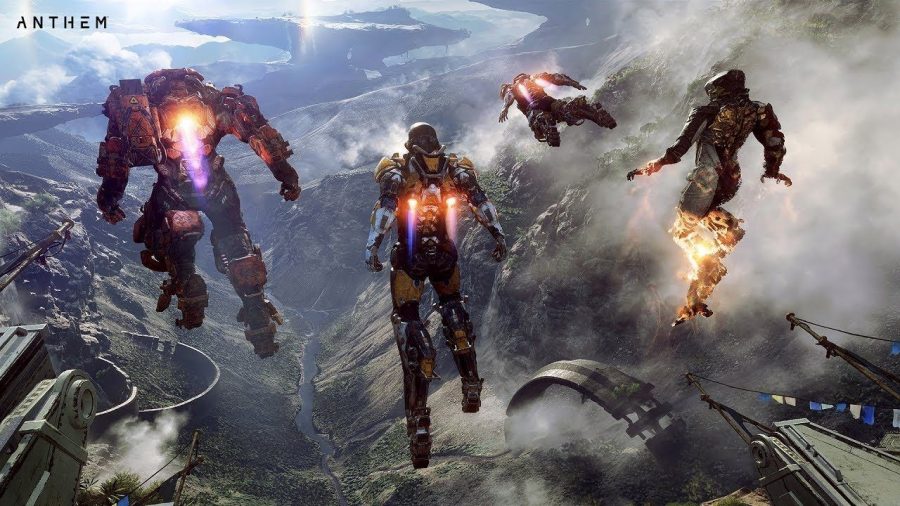Anthem Shows that the Gaming Industry Needs to Change
April 10, 2019
Game development studio BioWare, creators of the critically acclaimed Dragon Age and Mass Effect series, is much loved within gaming circles… until recently, that is.
Following the roaring success of Dragon Age: Inquisition in 2014, fans of the studio were hyped for its next two titles: Mass Effect: Andromeda and Anthem, which were set to launch in 2016 and 2019 respectively. But when they released, consumers were utterly disappointed. Both games were derided by reviewers and gamers alike for graphical issues, bugs, and lackluster storytelling unbefitting a studio of BioWare’s caliber.
Some argue that these issues stem solely from development issues. Both Andromeda and Anthem faced a slew of similar problems, such as technical issues with the Frostbite Engine or head developers leaving the company mid-project (Kotaku author Jason Schreier has an excellent piece on Anthem’s development you can read here). But BioWare isn’t the only studio that’s had its reputation bruised from poor releases.
DICE studios, the creators of the Battlefield series, caused controversy in 2017 with Battlefront II, which was half-baked and full of exploitative microtransaction systems. Bethesda studios, the creators of Fallout and Elder Scrolls, is facing community backlash over Fallout: 76’s abysmal launch.
So what’s gone wrong? I believe that the fault lies not with the developers, but rather the publishers and their marketing teams.
Empty Spectacle
Trade events like E3 or Gamescom are always exciting for game consumers. There, upcoming titles are revealed for the first time as either trailers or gameplay demos. There was a time where I found myself enraptured by all the new announcements that flashed across my computer screen. The same can be said for many in the gaming community as well.
E3 reveals are now met with cynical hesitation from viewers. The reason is simple; the gameplay demos that companies show off don’t represent the final product. More often than not, games often have graphical and technical downgrades once their released. Development studio Ubisoft is especially infamous for this practice.
Anthem in particular had the same issue. The E3 2017 presentation looked promising, even to a skeptical viewer. But when compared to the actual game, the downgrade is obvious. The graphics were scaled down considerably, and many gameplay features (such as dynamic wildlife interacting with the ecosystem, or world-changing storms) were absent.
To me, this highlights one of the biggest issues with the current gaming industry; the disconnect between development and marketing. Publishers are battling for consumers, and they want to make sure they have as many people interested in their products as possible. As a result, their ad campaigns often don’t reflect actual development.
Once again, this was also the case with Anthem. The developers were faced with mounting technical issues, loss of leadership, and indecisive executives. Development had been stagnating, and the game was far from ready for release. EA, however, wasn’t willing to delay any longer. Their E3 gameplay demo was made before Anthem even left pre-production; most of it was fake. Instead of giving the developers the time they needed, EA rushed out a half-baked mess to meet their release quotas.
What needs to change?
The solution to the game industry’s current woes is simple: it needs to give game developers the time necessary to finish their products. By setting fixed release dates and flooding consumers with flashy trailers and advertising, they simultaneously rush the developers and give their audiences false expectations.
Two companies that understand this well are Rockstar Games and CD Projekt Red. Rockstar’s Red Dead Redemption 2 was first teased in 2016, but was pushed back twice to 2018. Although the delays were a temporary disappointment for excited fans, the massive critical acclaim the game received speaks volumes about how important that extra time was.
CD Projekt Red did the same with The Witcher 3, delaying the title in order to stamp out as many bugs and finish as many unfinished features as they could. They’ve also noted community discontent with rushed titles, and have appealed to this sentiment with their newest title Cyberpunk 2077, which is slated for release “when it’s ready.”
Red Dead was first advertised with nothing but a stylized poster two years before release, with the marketing growing more detailed the closer to release the game was. Cyberpunk 2077 had a single CGI trailer in 2013, followed by silence from the studio. Both games showed their demos privately before showing them to greater audiences too, when they could’ve just as easily shown them off quickly to maximize the hype.
Many games, especially story-based ones, can be considered an art form on par with novels or cinema. Publishers need to realize that games need time to develop in order to reach their full potential, and that shipping them out unfinished in hopes of getting a quick cash grab is insulting to the medium. In that regard, the industry giants must change their ways.







